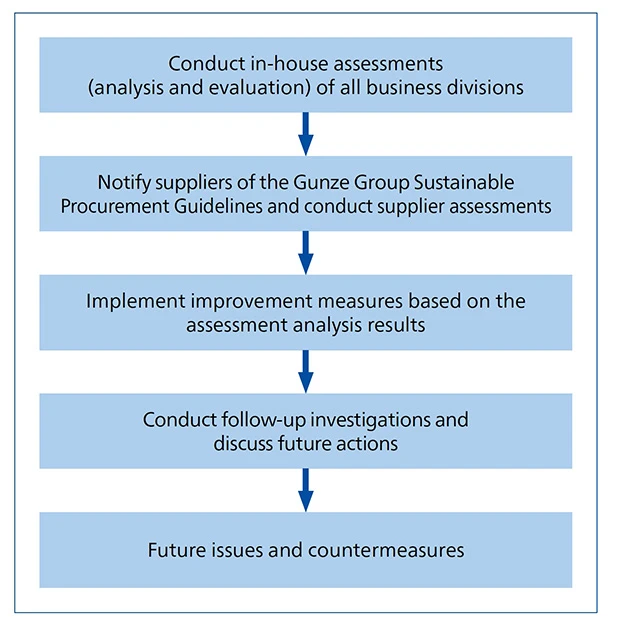GUNZE'S HUMAN RIGHTS POLICY STATEMENT
We have inherited our founder’s mindset and shared it as our corporate philosophy for over the 120 years: People-oriented approach, commitment to quality, and
harmonious coexistence.
The following " GUNZE’S HUMAN RIGHTS POLICY " is established in order to clearly express our commitment to ensuring the corporate
philosophy to respect for human rights.
1. We endorse the UN Global Compact, the UN Guiding Principles on Business and Human Rights and other international
principles relating to human rights.
2. In our business activities, we respect the human rights, individuality, and diversity, and do not discriminate
against people because of their race, nationality, gender, or other factors.
We strictly prohibit any child labor, forced labor and inhuman treatment including
cruel disciplinary punishments.
3. We implement the initiatives as stipulated in our in-house "Sustainability Promotion Rules" to respect the human rights of
all employees, identify the negative impacts on human rights and endeavor to remediate them ,through appropriate processes such as whistleblower system.
4.
We require our supplier to comply with " Gunze Group Supplier Code of Conduct" in accordance with the " Gunze Group Sustainable Procurement Guidelines", , gather
information on any risks that could cause negative impacts on human rights, and work to prevent and mitigate the identified negative impacts.
5. We continue
to provide necessary training for all employees to respect for human rights and deepen the understanding of employees on human rights issues.
With a corporate name that expresses our intent of protecting local communities as our basic policy, Gunze Founding philosophy takes a people-oriented approach.Over our
127 years of history, we have therefore valued the rights of employees and all other related parties. Inorder to clarify our stance on this respect for human rights
while taking into account international norms, we formulated and announced the GUNZE’s HUMAN RIGHTS POLICY in June 2022.
We are promoting human rights due diligence efforts to identify, analyze, and evaluate adverse impacts and risks on human rights both within our own Company and our
suppliers as well as to formulate and implement appropriate measures.
FY2022
In light of human rights risk cases involving non-Japanese technical interns at other companies, the Gunze Group also felt the need to ascertain and address any risks
and thus conducted a survey (of six factories in Japan) of the actual situation of non-Japanese technical interns in the apparel business, one of our main businesses.
Based on the items to be checked as exemplified in a separate volume of the Guidelines for Responsible Corporate Conduct in the Textile Industry*1 issued by
the Japan Textile Federation (JTF), for the purpose of the survey interviews were conducted with regard to appropriate working hours, wages, living environment, and
occupational health and safety at work sites. Although no major human rights risks were identified in the apparel business, as a result of the survey we discovered
issues that needed to be improved, such as ensuring that non-Japanese technical interns have access to consultation services.
FY2023
We have put in place a system for regular assessment by including a survey of the actual situation of non-Japanese technical interns in our internal audits. For the
FY2023 audit, we conducted on-site inspections, including interviews with non-Japanese technical interns, at three domestic factories to confirm the hygiene conditions
in their working environments. Based on the results of the FY2022 survey, we began preparations for a Vietnamese-language consultation service for Vietnamese technical
trainees, who account for the majority in the Gunze Group, so that we can rapidly respond to any issues that violate the laws governing technical training. Raising
awareness of the consultation service’s existence among all employees, including our Vietnamese technical interns, we will strengthen deterrence so that human rights
violations do not arise.
FY2022
The Gunze Group asks that suppliers understand the Gunze Group Sustainable Procurement Guidelines, which include the perspective of the Group’s respect for human
rights. In FY2022, we had key suppliers of all business divisions—75 companies in the apparel business, five companies in the medical business, and 14 companies in the
plastic films business—conduct self-assessments. To confirm the status of suppliers’ efforts with regard to respect for human rights, environmental conservation, and
quality and safety, for the assessment we asked suppliers to self-assess using the Global Compact Network Japan’s CSR Procurement Self-Assessment Questionnaire*2
and evaluated their responses. For those suppliers with low scores for potentially serious risk items in particular, we had the per- son in charge meet with them
individually and encouraged them with their efforts to make improvements.
FY2023
Self-assessments were conducted on nine suppliers in the engineering plastics field and 12 suppliers in the thread and accessories field. The evaluation results showed
that while large companies with capital of more than ¥300 million recorded high scores, small and medium-sized enterprises with capital of less than ¥300 million scored
low, revealing a tendency for insufficient efforts to be made. Those suppliers that had recorded low scores were sent feedback reports on the evaluation results and the
issues identified together in conjunction with individual interviews and other means. We will continue to conduct appropriate supply chain management through regular
monitoring. In the years to come, we will continue these efforts and promote collaboration with our suppliers in accordance with the Ten Principles in the four areas of
human rights, labor, the environment, and anti-corruption set out in the UN Global Compact.
*1 Guidelines for Responsible Corporate Conduct in Textile Industry: Guidelines for promoting corporate activities that respect international human rights, formulated
by the Japan Textile Federation in cooperation with the International Labor Organization (ILO) Office in Japan.
*2 Self-Assessment Questionnaire for CSR procurement: Questionnaire developed by the Global Compact Network Japan to assess degree of under- standing of CSR
requirements.
Human Rights Due Diligence*3 Implementation Flow

*3 A process for identifying negative impacts on and risks for human rights, analyzing and evaluating risks, and formulating and implementing appropriate measures